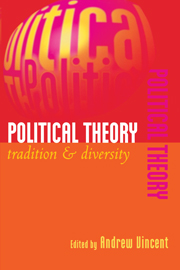Book contents
- Frontmatter
- Contents
- Preface
- List of Contributors
- Introduction
- 1 Political Theory and Conceptual Change
- 2 Political Theory and the Problem of Anachronism
- 3 Utilitarianism as a Public Philosophy
- 4 Rational Choice Political Theory
- 5 Republican Political Theory
- 6 Liberalism, Multiculturalism and Oppression
- 7 Postcolonialism and Political Theory
- 8 Legal Positivism and Political Power
- 9 Political Theory, International Theory, and the Political Theory of International Relations
- 10 Method Matters: Feminism, Interpretation and Politics
- 11 The Political Philosophy of Deleuze and Guattari
- 12 The Object of Political Theory
- Index
Introduction
Published online by Cambridge University Press: 29 March 2011
- Frontmatter
- Contents
- Preface
- List of Contributors
- Introduction
- 1 Political Theory and Conceptual Change
- 2 Political Theory and the Problem of Anachronism
- 3 Utilitarianism as a Public Philosophy
- 4 Rational Choice Political Theory
- 5 Republican Political Theory
- 6 Liberalism, Multiculturalism and Oppression
- 7 Postcolonialism and Political Theory
- 8 Legal Positivism and Political Power
- 9 Political Theory, International Theory, and the Political Theory of International Relations
- 10 Method Matters: Feminism, Interpretation and Politics
- 11 The Political Philosophy of Deleuze and Guattari
- 12 The Object of Political Theory
- Index
Summary
Many political theorists remain untroubled about the nature of the subject. The important thing in political theory is to get on and do it. In this reading, it is a form of thought with a direct practical orientation, and always has been since the ancient Greeks. It is concerned with logical coherence, rigour in argument, empirical accuracy, moral seriousness and practical efficacy. However, political theory, as a subject of academic study, is in a peculiar situation at present. In the anglophone world it has gone through a number of subtle transformations in the twentieth century – tracked in part in Terence Ball's opening chapter. After a period of doldrums during the 1950s, it has grown in significance. Despite times of travail in universities, there is no shortage of interest in the subject, if this is measured in terms of demand for journals and books. However, what does the average student of politics think they are entering into when starting a course on political theory? Are there any clear expectations as to what is being engaged in? In the period from 1945 up to the 1970s, a course entitled ‘political theory’, ‘political philosophy’ or, more nebulously, ‘political ideas’, could have entailed any of the following: the history of political theory – a text-based course relating to the purported canon of theorists; analytical political theory, a concept based course; or a refinement of the concepts course which focused on one hyper-concept or hyper-theorist.
- Type
- Chapter
- Information
- Political TheoryTradition and Diversity, pp. 1 - 27Publisher: Cambridge University PressPrint publication year: 1997
- 2
- Cited by



